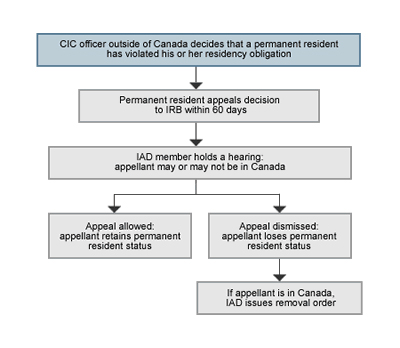Generally, the Immigration and Refugee Protection Act(IRPA) requires permanent residents to be physically present in Canada for at least 730 days out of every five years. If a permanent resident is outside Canada and a visa officer (also outside Canada) with Citizenship and Immigration Canada (CIC) finds that he or she has not met this residency obligation, the person may lose permanent resident status. The permanent resident may appeal the CIC decision to the Immigration Appeal Division(IAD) of the Immigration and Refugee Board of Canada (IRB). However, the person must appeal no later than 60 days after receiving the decision letter from CIC.
The appellant may be outside Canada. If the appellant was in Canada at any time over the past 365 days, CIC must provide a travel document so that the person can travel to Canada. In other cases, the person may apply to the IAD for a travel document. If the IAD decides that the appellant must be at the hearing in person, it may issue an order. CIC will then issue a travel document to allow travel to Canada for the hearing. Otherwise, the hearing may be held by telephone.
Either way, a member (decision-maker) will hear the appeal according to the IRB tribunal process. The appeal process involves two parties: the appellant and Minister's counsel who represents CIC. The process also usually public, so media or members of the public may attend or report on the proceedings.
 Outcome of the Appeal process
Outcome of the Appeal process-
If the appeal on residency obligation is allowed, the IAD will set aside CIC's decision and the person will keep his or her permanent resident status. If the appeal is dismissed, the person will lose permanent resident status. If the person is in Canada, the IAD must order his or her removal from Canada.
 Residency Obligation Appeal Process
Residency Obligation Appeal Process-



_20170222121058.jpg)